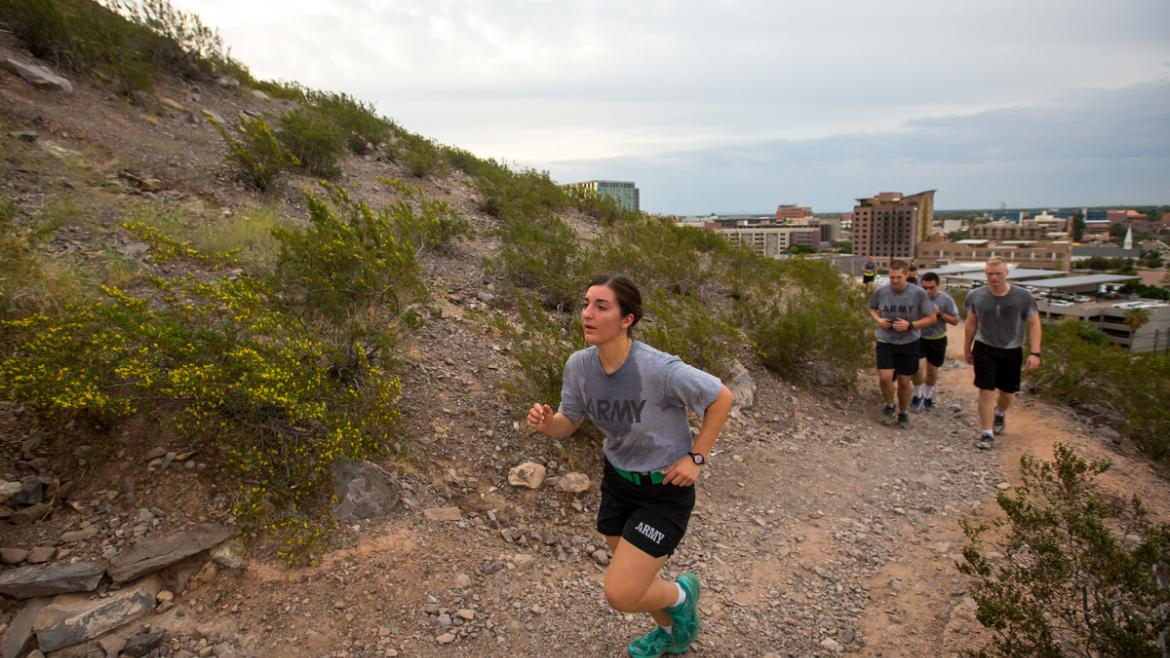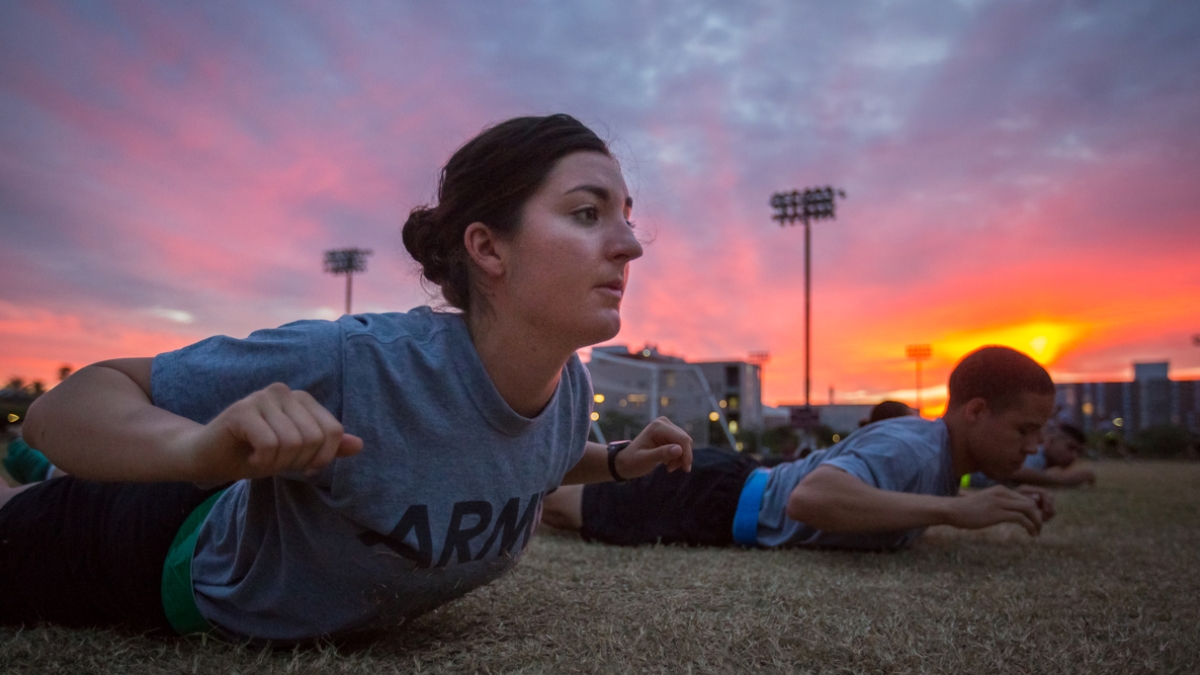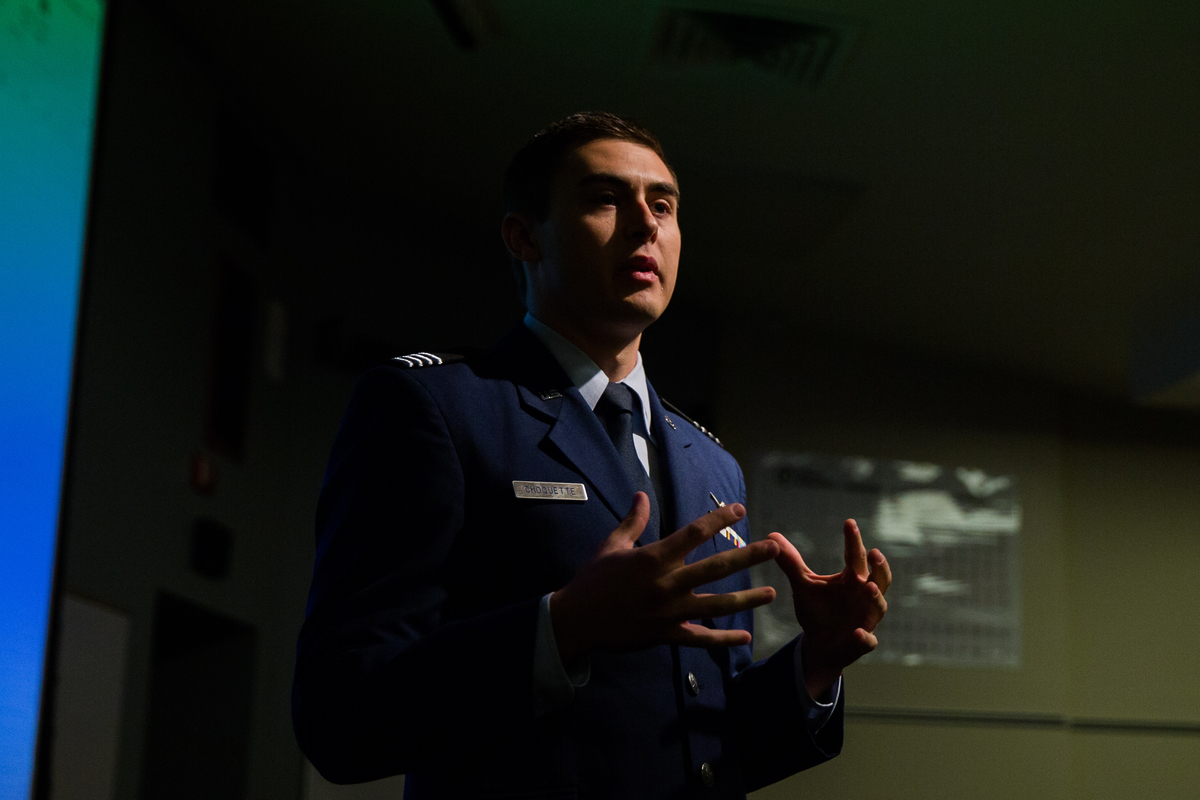Editor's note: This feature is part of a series profiling different slices of ASU's diverse population. Find more stories here.
It’s safe to say most college students are still in bed when the men and women of the Reserve Officers’ Training Corps are sprinting up A Mountain or giving a briefing in full dress uniform at dawn.
And while other undergrads prepare for work, these students prepare for war as commissioned officers in the United States Armed Forces.
As such, these cadets are expected to be able to run a mile and a half in nine minutes, 12 seconds; do 68 push-ups in a minute; and complete 57 sit-ups in 60 seconds.
“It’s not your typical college lifestyle, that’s for sure,” said Cadet Colonel Dalton Choquette, Air Force ROTC, who wakes up at 5 a.m. every Monday, Wednesday and Friday as part of the lifestyle.
In addition to the normal rigors of being an undergrad — the reading, papers, tests, cramming and extracurriculars — ASU’s roughly 500 cadets train, drill, plan and execute missions.
“Nights and weekends are recovery,” said Cadet Operations Officer Katie Richardson, Army ROTC. “My friends make fun of me because I’m in bed by 8 or 9. … It’s a sacrifice I have to make. People ask a lot of me during the week, so I really do need to recuperate.”
However, cadets like Choquette and Richardson bloom in these circumstances.
“I thrive when I have every moment booked up,” said Richardson, who is earning dual majors in psychology and political science and is a student in Barrett, The Honors College. “I live by my planner. Everyone uses their phone nowadays. I still use a paper planner every day.”
Upperclass cadets assume leadership roles: planning, maintaining staffs of underclassmen to plan missions, and executing missions.

Cadet Operations Officer Katie Richardson runs up A Mountain during early morning physical training with the Army ROTC Alpha Company, First Platoon.
Photo by Charlie Leight/ASU Now
Another difference between ROTC and traditional students are job restrictions. Cadets cannot work in a coffee shop or at a breakfast joint, for instance, because of their early morning responsibilities.
“You have a contract saying to the Air Force, ‘I have these requirements to meet if I want a commission as a second lieutenant after I get my degree,’ ” Choquette said. “If you can’t meet those requirements, this program has no problem saying to you this probably isn’t the best route for you.”
With a 3.8 grade-point average and being twice named to the Dean’s List, he has obviously balanced responsibilities well.
“A lot of the cadets mature faster than traditional college students because of the additional pressures,” said Choquette, a history major. “We have minimum requirements. Failing a class can mean not being in this program anymore.”
A promising future
Being a senior means the tempo has slowed a bit for Richardson, a fourth-generation Tempe native.
She now has time to go out with friends or maybe catch a football game. Another way for her to relax is to train for triathlons.
Richardson ended up in ROTC through personal tragedy. Her grandfather was a two-star general who attended West Point — both her father and brother served as Marines — and she had an appointment to follow in her grandfather’s footsteps.
Two weeks before she left for initial summer training, the appointment was rescinded because of a concussion on her medical record. In an instant her entire life’s plan was destroyed.
“I wanted nothing to do with the Army,” she said. “The colonel here at the time sought me out — he had heard my story from a mutual friend. He offered me a scholarship. I wanted nothing to do with it. … I said, ‘All right, I have nothing to lose at this point. I’ll see what this ROTC thing is about.’
“I’m glad I took the leap and never looked back. I hit the ground running here, joined the Ranger Challenge and ran seven miles in full kit the next day.”
Being Army ROTC and being at ASU has been very fortunate for Richardson. She has worked in a defense think tank in Washington, D.C., learned Chinese in North Carolina and trained in Spain with the Spanish Special Forces.
In November, Richardson will find out where she has been assigned. Besides military intelligence, she has applied to two airborne regiments, the 173rd Airborne Brigade in Vicenza, Italy, or the 82nd Airborne Division in Fort Bragg, North Carolina.
“Either of those would be fun,” she said. “Italy, because it’s an international duty station. Fort Bragg is probably the most Army you can get. It’s super ‘hooah.’ Either one of those would be a great assignment out of the gate.”
Cadet Colonel Dalton Choquette gives his weekly announcements concerning volunteering opportunities to other cadets at the Life Sciences Building A early Sept. 24 on the Arizona State University campus in Tempe. Photo by Deanna Dent/ASU Now
The flying gene
Choquette is a self-described military brat who grew up on air bases in Japan, Tucson and Virginia. His father is a decorated Air Force colonel with more than 300 hours flying combat helicopter missions.
This summer Choquette will report to his duty station and find out what flight school base he gets assigned to. A year after that, he will report to either Texas, Oklahoma or Missisippi for flight school. Coming as a surprise to no one, he wants to fly helicopters.
“Everyone says, ‘It’s because of your father!' ” he said with a laugh. “I’d be lying if I said he didn’t have anything to do with it.”
All pilots crave different aircraft — the speed of the F-16, the bristling guns of the A-10 Warthog, the hulking size of the Globemaster.
“I think the HH 60 is a pretty darn good-looking aircraft, too,” Choquette said of the Pave Hawk rescue helicopter his father sometimes flies. “For me, it’s all about the mission. Combat search and rescue is by far one of the most unique and valuable missions the Air Force has. To be the military’s 911 — they get that call and they rush out there.”
As he looks into his future, Choquette has a lot of pride for his past, having loved every minute of his ROTC experience.
“This program has been awesome for me,” he said. “When you finish this program, you are going to be prepared to be a warrior at the end of the day.”
More Sun Devil community

ASU student, Navy vet pursues greener future in sustainability
As Arizona State University holds its annual Salute to Service celebration, honoring individuals who serve the nation and their communities, Shana Harly stands out for her commitment to both her…

No limits to a mother’s love, a wrestler’s determination
Judy Robles was washing dishes in the kitchen of her California home and keeping an eye on her young son, who was playing in the park that backed up to the house.She looked down for a second, maybe…

A symphony of service: Iraq War vet and ASU alum finds healing through music
At the age of 30 and only one credit away from obtaining his bachelor’s degree in piano performance, Jason Phillips could no longer stifle the feeling that he was stuck. He was teaching at a…

